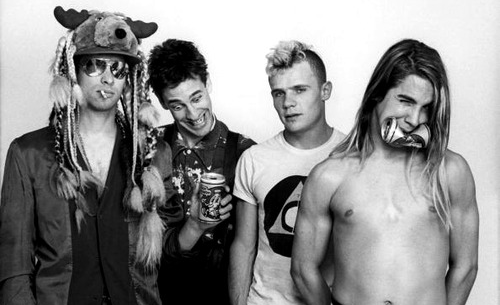1) True Men Don’t Kill Coyotes: 2) Baby Appeal; 3) Buckle Down; 4) Get Up and Jump; 5) Why Don’t You Love Me 6) Green Heaven; 7) Mommy, Where’s Daddy?; 8) Out in L.A.; 9) Police Helicopter; 10) You Always Sing; 11) Grand Pappy Du Plenty
More energy than skill at this point, but there's a charm to its mindless flailing around.
Key tracks: "True Men Don't Kill Coyotes", "Baby Appeal", "Get Up and Jump"
You look at the Red Hot Chili Peppers’ debut and you kind of just have to wonder how they ever got signed, how the album ever got made and – most bafflingly – how a band like this could ever end up being so massive. It just makes no sense.
In a wonderful twist of cosmic sense of humour, Red Hot Chili Peppers officially began with what they’ve become semi-notorious with over the years: with changing members. The original Red Hot Chili Peppers featured the mainstays Anthony Kiedis and Flea alongside guitarist Hillel Slovak and drummer Jack Irons – four best friends having a laugh and a riot, their charismatic combination providing much of the wild excitement the band made their name with early on. They were ludicrous and had more energy than musical talent at this stage, but somehow someone decided they were worth signing for because why not. And then suddenly Irons and Slovak had to go – they had split their time with bands other than the Peppers and now they were forced to choose. After a lot of hard thinking and a lot of complications, they chose the other bands. So, the Peppers were meant to get ready to record their first album, while missing 50% of their tight membership. Issue one.
They soon ended up recruiting Cliff Martinez and Jack Sherman as the replacements. Martinez was a fine choice: his personality gelled with the band and so did his musical sensibilities (and he had a kickass moose hat). Sherman, less so. Kiedis’ autobiography goes into great detail about the Sherman situation (biased as it is) and how his attitude was vastly different to the rest of the band’s wild spirit. Half of the blame was arguably on Kiedis’ side as well – Sherman had the misfortune of replacing Kiedis’ BFF Hillel and got treated with a cold shoulder as a result, invoking Kiedis’ wrath through minor things that Hillel wouldn’t have done like e.g. wanting to add acoustic guitars on some of the tracks. Sherman ended up bonding with the record’s assigned producer Andy Gill, who didn’t really care for the band or their music and thus the studio time became an awkward, uncomfortable time of cold war between two factions forced to work together. Issue two.
The resulting album: 30-odd minutes of ramshackle funk rock played a little too stiffly, wrapped up in a zero-budget, typically 80s production work. Issue three. At this stage Peppers were primarily a live band because in such an environment they could work through their lack of musical finesse with pure manic energy. Not so much in the studio environment, and when recorded it’s easy to see how green the band still were. The production is dry and lifeless, sapping out most of the energy the band could carry into the studio. The album carries the feeling of a car crash, of everything that could have gone wrong doing so and leaving a young band completely helpless on the shore. Sometimes it feels like the short length is the result of no one simply wanting to continue any longer.

That goofy charm keeps the album relatively afloat. There is little of musical value on the debut and absolutely nothing that would deserve a popularity revival or be mentioned in the greater scheme of things – this isn’t even a Pablo Honey case where a maligned hit makes an appearance and forces the album to be acknowledged. It is hard not to smile though whenever “Get Up and Jump”, “Buckle Down” or “Baby Appeal” make appearances, and that’s what ultimately gives the album the little saving grace it gets. It’s a silly, fun 30-minute splash that goes in and out but at least raises a smile. That’s something, arguably.
The album closes befittingly nonsensically. After ten tracks worth of varyingly ridiculous newbie funk rock, “Grand Pappy Du Plenty” appears and finishes the album with a moody Western-inspired instrumental out of nowhere. It’s like listening to a completely different band who’s interested in a wholly different musical direction, who suddenly have vision and talent. It’s a revelation that there’s so much more to the Peppers than they initially reveal to be and a small hint at why this band would end up lasting for a couple of decades instead of the couple of months the album otherwise hints at. That it’s immediately preceded by the short and frantic “Police Helicopter” and the thoroughly pointless shout-along “You Always Sing”, just makes the contrast even more absurd (and makes it feel like the album’s tail end was a dumping ground for random junk). The kicker is, of course, that “Grand Pappy Du Plenty” is not actually very interesting beyond that. The story of this album, then.

No comments:
Post a Comment